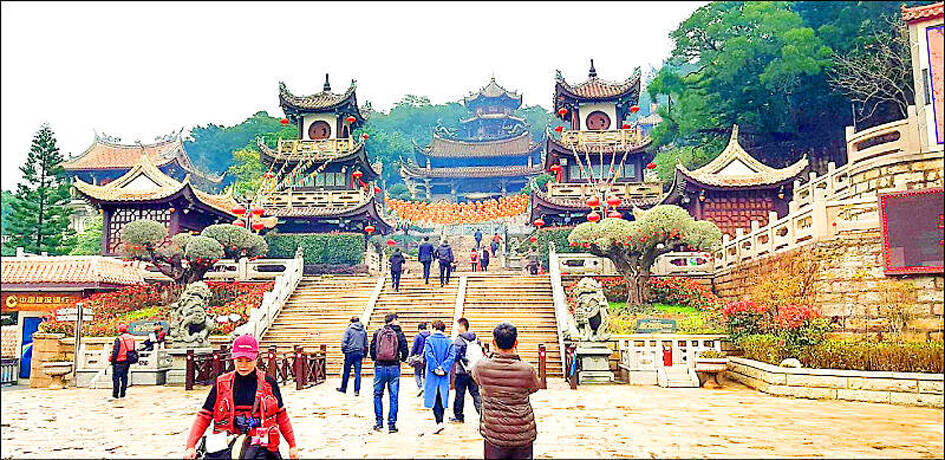Chinese representing temples they claim to be ancestral temples of those in Taiwan who apply to visit Taiwan for “religious exchanges” would have their applications rejected, a source said on Sunday.
Religion in China is managed by the Chinese Communist Party (CCP), which often uses so-called “religious exchanges” to conduct “united front” work against Taiwan, the source said.
Attempts to use ancestral temples as a pretext to conduct pilgrimages in Taiwan treat the nation as if it were under Chinese jurisdiction — and that would be rejected, they said.

Photo: Taipei Times
Since last month, China’s Taiwan Affairs Office (TAO) and related agencies have hosted religious ceremonies honoring the mythical figure the Yan Emperor (炎帝), who is regarded as one of the earliest ancestors of Chinese and is worshiped as the god of agriculture.
The TAO invited former Straits Exchange Foundation chairman Lin Join-sane (林中森), who is a member of the Chinese Nationalist Party (KMT), to attend ceremonies worshiping the Yan Emperor at two locations: Suizhou City in Hubei Province, which is considered to be Yan’s hometown; and Zhuzhou City in Hunan Province, where Yan’s mausoleum is located. Representatives of temples in Taiwan also attended, and participants of the ceremonies planted trees in a forest the CCP called the “cross-strait shared roots forest.”
It was a symbolic event promoting the unification of Taiwan and China, they said.
Separately, the CCP last month invited representatives of Taiwanese temples to visit Fujian Province and attend celebrations for the birthday of the sea goddess Matsu (媽祖) at the Meizhou Matsu Temple. The CCP has also named Chinese actress Liu Tao (劉濤) and Sun Yat-sen School president Chang Ya-chung (張亞中) as “Matsu ambassadors” to promote ancestral temple culture to younger audiences.
Late last month, the CCP held the “Chongqing-Taiwan Folk Culture Exchange” in Chongqing City, inviting more than a dozen Taiwanese folk culture representatives, including researchers, artisans and performers, to visit various temples in China. Later that month, the TAO also organized visits for Taiwanese relatives of Chinese citizens to a martyrs’ cemetery in China, saying the aim was to make the visitors “feel deeply connected with the motherland.”
Additionally, 10 Chinese nationals last month were found to have bypassed the government’s oversight on religious exchanges by applying for an “agricultural technology-related visit,” but attempted to take part in the Baishatun Matsu pilgrimage, the source said.
Fumei Temple, which the 10 Chinese nationals belong to, does not even hold pilgrimages in China, yet sought to conduct an “ancestral temple pilgrimage” in Taiwan, the source said.
“There was no actual deity involved. It was simply a ‘united front’ operation intended to deceive devout Taiwanese believers,” the source said.
China is a country without religious freedom, and it is “bizarre” for Taiwanese temple representatives to engage in religious exchanges there, they said.
“The CCP manages religion from a political standpoint — its religious affairs bureau is under the United Front Work Department,” they said. “Taiwanese adherents of the Yiguandao religious movement have been detained in China and remain imprisoned.”
Since January of last year, more than 100 cases of Taiwanese citizens being questioned or detained due to their religious practices have been recorded, the source said.
The public should approach travel to China with a degree of caution and avoid cooperating with the CCP’s “united front” operations, they added.

The manufacture of the remaining 28 M1A2T Abrams tanks Taiwan purchased from the US has recently been completed, and they are expected to be delivered within the next one to two months, a source said yesterday. The Ministry of National Defense is arranging cargo ships to transport the tanks to Taiwan as soon as possible, said the source, who is familiar with the matter. The estimated arrival time ranges from late this month to early next month, the source said. The 28 Abrams tanks make up the third and final batch of a total of 108 tanks, valued at about NT$40.5 billion

Two Taiwanese prosecutors were questioned by Chinese security personnel at their hotel during a trip to China’s Henan Province this month, the Mainland Affairs Council (MAC) said yesterday. The officers had personal information on the prosecutors, including “when they were assigned to their posts, their work locations and job titles,” MAC Deputy Minister and spokesman Liang Wen-chieh (梁文傑) said. On top of asking about their agencies and positions, the officers also questioned the prosecutors about the Cross-Strait Joint Crime-Fighting and Judicial Mutual Assistance Agreement, a pact that serves as the framework for Taiwan-China cooperation on combating crime and providing judicial assistance, Liang

A group from the Taiwanese Designers in Australia association yesterday represented Taiwan at the Midsumma Pride March in Melbourne. The march, held in the St. Kilda suburb, is the city’s largest LGBTQIA+ parade and the flagship event of the annual Midsumma Festival. It attracted more than 45,000 spectators who supported the 400 groups and 10,000 marchers that participated this year, the association said. Taiwanese Designers said they organized a team to march for Taiwan this year, joining politicians, government agencies, professionals and community organizations in showing support for LGBTQIA+ people and diverse communities. As the first country in Asia to legalize same-sex

MOTIVES QUESTIONED The PLA considers Xi’s policies toward Taiwan to be driven by personal considerations rather than military assessment, the Epoch Times reports Chinese President Xi Jinping’s (習近平) latest purge of the Chinese People’s Liberation Army (PLA) leadership might have been prompted by the military’s opposition to plans of invading Taiwan, the Epoch Times said. The Chinese military opposes waging war against Taiwan by a large consensus, putting it at odds with Xi’s vision, the Falun Gong-affiliated daily said in a report on Thursday, citing anonymous sources with insight into the PLA’s inner workings. The opposition is not the opinion of a few generals, but a widely shared view among the PLA cadre, the Epoch Times cited them as saying. “Chinese forces know full well that